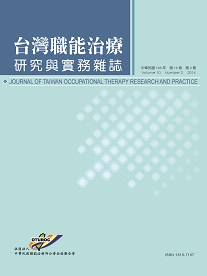Journal of Taiwan Occupational Therapy Research and Practice

半年刊,正常發行
記憶是人類認知層次的重要功能之一,它涉及到人類生活的各個面向,是學習各種事物的基礎。因此,腦傷患者的記憶功能障礙不但會對其日常生活功能造成影響,也會因為患者無法將治療師所訓練的技巧加以熟記,造成復健治療的主要障礙。本文將介紹記憶的相關理論、記憶扭曲的現象,以及記憶功能障礙和傳統常用的記憶測驗。最後,將特別介紹-標準化的記憶評估工具-情境式記憶測驗。此測驗的特點在於除了能夠判斷患者的記憶功能是否受損之外,並可同時評估其後設記憶功能與記憶策略的使用情形,以進一步做為後續之記憶訓練的依據。情境式記憶測驗在臨床上的實用性已在多篇的研究報告中獲得支持,故希望藉此機會介紹給國內的臨床治療人員。
Memory is involved with every aspect of daily life and plays an important role in learning. Therefore, memory impairments caused by brain injury present a major barrier to rehabilitation because the individual is unable to learn or carry over techniques taught by occupational therapists. The purpose of this paper was to present briefly several key topics about memory, including theories of memory, metamemory, the phenomenon of memory distortion, memory dysfunction and assessment tools. Finally, the Contextual Memory Test (CMT) was emphasized especially. The unique characteristics of the CMT is that it provides objective measures of memory dysfunction, metamemory and strategy use. In addition, the CMT further links assessment results with the following treatment. The results of several studies have shown that the CMT is a valuable memory and metamemory assessment tool for use with different client populations. Recommendations for clinical application are discussed.












